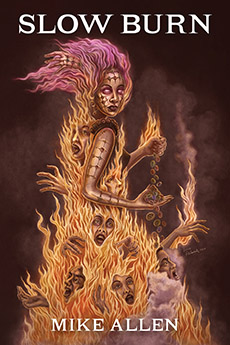Featured Story • February 2018
A Thing with Feathers
Jennifer R. Donohue
Lilybeth long ago learned to never wipe away her tears, because Mother bottled those to sell. Mother never promised in so many words that the bottled tears would be miraculous, but people believed what they wanted to. For as long as she could remember, her parents sold bits and pieces of their miracle child off the back of a wagon, revisiting towns only rarely, never staying long in the same caravan. Mother saved coins to an end Lilybeth never fully understood, and Papa drank as many coins as he was able, and with that cycle in place it didn’t seem possible for an end to ever be in sight.
Papa was as silver tongued as his daughter was silver haired and, drunk or sober, lived to tell stories. Lilybeth was not permitted much activity, or any socializing, and his stories were her only real escape from Mother’s expectations, from the back of the wagon, and the now well-polished tale of her own celestial heritage. She didn’t know how much of what they said was true, and how much of it was cobbled together from Papa visiting a variety of temples in their travels and embellishing with his own lively imagination. Lilybeth herself had never been in a temple, and indeed had been kept actively away from such places and the people who ran them.
The latest town the caravan rumbled into on rutted roads was subdued, mourning crepe hung in windows, on doorways. Even the weather was downcast, wet and heavy gray clouds hanging in the sky. A charred smell hung in hard-chilled the air. “Papa, what is that?” she asked from inside the covered wagon.
“Funeral pyres,” he said, after a pause.
“They had a sickness here.”
“How terrible.”
“They’ll be happy to see somebody like you,” Mother said. “Make sure you’re ready.”
“I’m ready.” There wasn’t anything to be but ready. Her only clothes were the bleach-white linen dresses Mother endlessly sewed. Sometimes they sold those too. Lilybeth’s hair hung loose and unadorned past her waist, brushed the requisite hundred strokes daily; it had always been the silver sheen of coins, the earliest indication that she was not a normal child. Then a passing traveler had told Papa over their cups that Lilybeth’s baby babble was in fact the tongue in which the angels spoke.
The final wagon in the caravan, they stopped at the edge of the town’s market. Papa came to the back of the wagon and pulled out the little platform they had, set it up. Mother came to the back as well and seemed to be looking for something as she gestured for Lilybeth to alight.
The other caravaners only sometimes came to see the presentation. They’d heard the story and seemed to think Lilybeth was an okay kid, and they liked drinking with Papa (everybody liked drinking with Papa), but even Lilybeth could tell they didn’t favor Mother. Papa handed Lilybeth up onto the platform, and she looked out over the somber faces of the townspeople, many wearing black armbands on their homespun sleeves. She wondered what they did here, whether it was farming, or mining, or what. She wondered what kinds of stories they told.
Mother got up onto the platform behind her, to one side, as she had so many times before. Papa positioned the lamps. He glanced up and hesitated for a moment, then continued about his business, the slightest frown rumpling his brow.
“We know you’ve had sickness,” Mother began. “And I don’t want to say what I have to sell you today is a guaranteed charm against it. But the girl you see before you has never been sick a day in her life. The girl you see before you is the work of angels, who saw fit to gift her into our care.” Papa lit the lamps, and Lilybeth’s winged shadow unfurled on the canvas of their wagon in stark contrast to her unwinged form. There were some gasps in the growing crowd, murmurs. More of the caravaners seemed to be at the fringes of things than usual. “We’ve never done this before, but we sincerely hope it helps your community.”
This was not quite their usual fare, and Lilybeth turned her head when she heard Mother’s heavy sewing shears open. But what protest could she make, after years of being kept docile as a lamb? She faced forward again as the shears closed, opened, closed again, and as the tears fell with the hanks of hair about her feet and Papa collected the coins, Mother actually let some people on the platform, to touch Lilybeth’s cold clear skin. Feel the tears she shed “out of compassion for your woes,” Mother said. People had not been allowed to touch her like that before, only Mother and Papa.
Mother cut all her hair off close, shingled against her skull, and sold off every stray strand to anybody with the coin for it. She sold the tears, a few drops trapped in each little vial, and when they ran out of bottles, she sold handkerchiefs that had wiped away some of those tears. There was no shortage of tears, for those who had sickened and died, for those who mourned, and Lilybeth wept for herself as well. Being publicly shorn like that was somehow shameful, as though Mother might next scourge her instead and bottle the shed blood.
But then, after an eternity, it was over and Lilybeth was permitted to return to the privacy of their closed wagon, her prison and her sanctuary. Papa went off with a pocketful of coins and some new friends, all eager to swap stories.
She lay awake on her cot for a time, listening to the town sounds, stroking a hand over the hair she had left. It would grow back. It was only hair. Who knew, perhaps it would grow back overnight and this would happen to her every time they came to a town, a permanent part of the new routine.
Eventually she slept, and when the dream came to her, it seemed true, destined to happen to her: walking barefoot into the snow, tears trickling down her cheeks and freezing in the night air, moonlight shimmering off her spun-silver hair which again hung to her waist. Blood seeped through the back of her nightgown where wings would be if she and her shadow matched. She thought of Mother’s shears and woke with a gasp, her heart in her throat.
Papa was back, drink flushed, and with a present. “It seemed like just the thing for you,” he said in a too-loud whisper, jostling a cooing wicker cage around.
“What is it?” she asked sleepily, unsettled.
“A pretty pet.” And inside the cage was a white bird, a dove maybe, with inkblot eyes and grey feathers barring its wings.
“Thank you,” she breathed, petting its trembling head with one finger, crying again as she held the cage in her lap. The whole thing quivered with the bird’s frantic heartbeat, and Papa settled himself with Mother at the other end of the wagon.
When the day dawned, Lilybeth’s hair had not grown back overnight, thought it did seem longer than it ought to have been. “What is that?” Mother asked.
“Papa gave it to me,” Lilybeth said. “Isn’t it pretty?”
“Just what we needed.” Mother stepped out to begin making breakfast, the rest of the caravan waking up around them.
“We’re leaving today,” Papa said.
“Already?”
“With the sickness, nobody’s buying much from the other wagons. And we can’t exactly do our trick twice.” He ruffled Lilybeth’s shorn scalp. “So on to the next place.”
“Papa? Why do we do this?”
“That’s something to talk to your mother about,” he said. He pulled on his jacket, found a flask in the pocket, and tipped her a wink as he took a sip. She wasn’t going to ask Mother.
They had their small breakfast of oats and honey and packed their things back into the wagon. None of the townsfolk came to see them off, and Lilybeth wondered what they had done with her tears, her hair. Were they saving the items, in case of another sickness, or were they ashamed after passing a long dark night with them? Her back itched, and she looked at the bird in its cage, still now, and thought about her dream.
“Get in the wagon,” Mother said, and Lilybeth did, slowly. She knew, without reservation, that things with feathers should not be in Mother’s care. On impulse, she opened the cage door and in a flurry of awkward wings and shed feathers, the bird was away into the bushes as the caravan as a whole began to move on.
“Why would you do that with your father’s gift?” Mother snapped. “Now it’ll just die in the cold, or a cat will get it.”
“Winged creatures shouldn’t live in cages,” Lilybeth said. And maybe somebody in town saw her do it, and maybe they would take the bird in, if only because she had touched it. It was enough to hope for, as they trundled back down the rutted road, toward the next town.
 Jennifer R. Donohue grew up at the Jersey Shore and now lives in central New York with her fiancé and her Doberman. Though her degree is in psychology, she works at her local public library, where she also facilitates a writing workshop. Her short stories have appeared in Daily Science Fiction, Far-Fetched Fables, Mosaics 2: A Collection of Independent Women, The Sockdolager, and Syntax & Salt Magazine. She blogs at Authorized Musings, where she shares fiction and the tribulations of the writing life, and tweets at @AuthorizedMusin.
Jennifer R. Donohue grew up at the Jersey Shore and now lives in central New York with her fiancé and her Doberman. Though her degree is in psychology, she works at her local public library, where she also facilitates a writing workshop. Her short stories have appeared in Daily Science Fiction, Far-Fetched Fables, Mosaics 2: A Collection of Independent Women, The Sockdolager, and Syntax & Salt Magazine. She blogs at Authorized Musings, where she shares fiction and the tribulations of the writing life, and tweets at @AuthorizedMusin.
![]()
If you’ve enjoyed what you’ve read, please consider pitching in to keep us going. Your donation goes toward future content.
![]()















